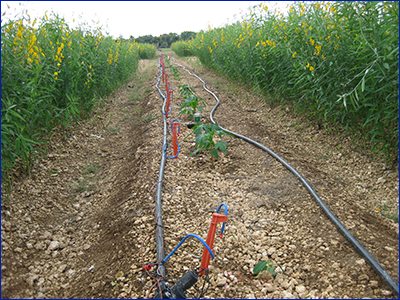Water and Agriculture: Irrigation
Irrigation is used to provide water needed by plants that is not provided by rainfall. How irrigation is managed and the type of water used for irrigation varies throughout the state depending on the particular crop and resources available. A fundamental component of efficient irrigation is to determine the quantity of irrigation needed and when to apply it, or irrigation scheduling.
Reclaimed Water as an Irrigation Source
Traditionally, groundwater and surface water resources were used for irrigation. However, the demand on water supplies has led to a growing interest in reclaimed water sources.
EDIS Publications
- Reclaimed Water Use for Edible Crop Production in Florida
http://edis.ifas.ufl.edu/ss561 - Reclaimed Water and Florida’s Water Reuse Program
http://edis.ifas.ufl.edu/ae448
.
Irrigation management
Irrigation systems may be managed using different approaches. In addition, irrigation systems may be modified to increase water use efficiency or to accommodate new production conditions.
EDIS Publications
- Vegetable Production Handbook. Chapter 3. Principles and Practices of Irrigation Management for Vegetables
http://edis.ifas.ufl.edu/cv297 - Converting from seepage irrigation to plasticulture for vegetable production: a case study and on-farm demonstration.
http://edis.ifas.ufl.edu/hs1246 - Subsurface drip irrigation to improve water distribution of seepage irrigation systems in Florida.
http://edis.ifas.ufl.edu/hs1217
Irrigation Scheduling
Irrigation scheduling refers to how the amount and timing of irrigation is determined. There are different ways to approach irrigation scheduling, including soil moisture sensor (SMS) based methods and evapotranspiration or weather based methods. Tensiometric methods may also be used.
I. SMS-based
SMS-based irrigation scheduling relies on using a sensor to estimate soil water content for making decisions on when to irrigate.
II. Weather/evapotranspiration (ET) data
Weather- or ET-based scheduling relies on weather data to create a water balance which estimates irrigation needs.
III. SMARTPHONE APPS
Smartphone apps have been developed to assist with determining irrigation schedules for different commodities.
IV. TENSIOMETERS
Tensiometeric methods rely on using soil-water suction as a measurement of plant-available water.
